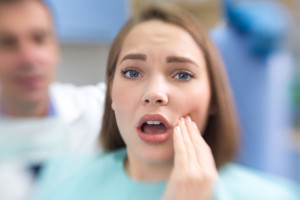 Cavity risks vary from person to person – one potential issue could be a serious problem for you, but have little effect on another person. You can work with your dentist to develop a full understanding and appreciation of your particular risks. That being said, there are common threats to your teeth that should be acknowledged. Part of caring for your oral health is being vigilant. You can clean your teeth regularly and see your dentist to limit problems. If you think something is wrong, seek treatment as soon as you can. A cavity caught in time will affect a relatively small portion of your tooth, and your dentist can restore that tooth with a filling. If you ignore a problem, it can become more serious, and may leave you needing a dental crown. (more…)
Cavity risks vary from person to person – one potential issue could be a serious problem for you, but have little effect on another person. You can work with your dentist to develop a full understanding and appreciation of your particular risks. That being said, there are common threats to your teeth that should be acknowledged. Part of caring for your oral health is being vigilant. You can clean your teeth regularly and see your dentist to limit problems. If you think something is wrong, seek treatment as soon as you can. A cavity caught in time will affect a relatively small portion of your tooth, and your dentist can restore that tooth with a filling. If you ignore a problem, it can become more serious, and may leave you needing a dental crown. (more…)
Quiz: Receiving A Full-Mouth Rehabilitation
 A full-mouth rehabilitation can be arranged through your dentist if you have serious work that needs to be done on your teeth. This is a process that can take time, and multiple treatments, but it can result in you having your oral health fully restored. The course of your rehabilitation will depend on the current condition of your teeth; your dentist will help you organize the treatments you need. Procedures can range from strictly health-focused, to work that leaves your smile bright and attractive. (more…)
A full-mouth rehabilitation can be arranged through your dentist if you have serious work that needs to be done on your teeth. This is a process that can take time, and multiple treatments, but it can result in you having your oral health fully restored. The course of your rehabilitation will depend on the current condition of your teeth; your dentist will help you organize the treatments you need. Procedures can range from strictly health-focused, to work that leaves your smile bright and attractive. (more…)
Avoid Habits That Can Hurt Your Oral Health
 Your daily behaviors can work for, or against, your general oral health. From your diet choices to your oral cleaning habits, your actions can influence how likely you are to suffer problems like tooth decay. If you are diligent about brushing and flossing, and enjoy a sensible diet, you can keep your teeth in good shape. Habits that are neglectful of your oral health can lead to a buildup of problems. If you are too slow to respond to issues that develop, you could find yourself in need of multiple treatments. For those who have let their oral care slide for a prolonged period, a full-mouth rehabilitation may be required. (more…)
Your daily behaviors can work for, or against, your general oral health. From your diet choices to your oral cleaning habits, your actions can influence how likely you are to suffer problems like tooth decay. If you are diligent about brushing and flossing, and enjoy a sensible diet, you can keep your teeth in good shape. Habits that are neglectful of your oral health can lead to a buildup of problems. If you are too slow to respond to issues that develop, you could find yourself in need of multiple treatments. For those who have let their oral care slide for a prolonged period, a full-mouth rehabilitation may be required. (more…)
Preventing Serious Tooth Decay
 Your goal should be to avoid tooth decay entirely, with diligence and regular visits to your dentist. If you do have a cavity form on your tooth, you should make sure to have it treated before it becomes serious. Because so many adults will develop a cavity in their lifetime, it is important to understand how to handle treatment, even if you feel you have little to no current risk of having one develop. A cavity will need professional treatment if you want to avoid losing your tooth. Seeking that treatment promptly can leave more of your healthy tooth untouched by decay; restoring your tooth in this case can only require a dental filling. (more…)
Your goal should be to avoid tooth decay entirely, with diligence and regular visits to your dentist. If you do have a cavity form on your tooth, you should make sure to have it treated before it becomes serious. Because so many adults will develop a cavity in their lifetime, it is important to understand how to handle treatment, even if you feel you have little to no current risk of having one develop. A cavity will need professional treatment if you want to avoid losing your tooth. Seeking that treatment promptly can leave more of your healthy tooth untouched by decay; restoring your tooth in this case can only require a dental filling. (more…)
Replacing A Lost Tooth Can Help You Avoid TMJ Problems
 TMJ problems can mean frequent discomfort, and difficultly with basic jaw movements. It is an uncomfortable, unpleasant condition. While there is no single reason someone will develop issues around their jaw joints, missing teeth can increase your risk. Not only is tooth loss a cosmetic issue, it can also make it difficult to chew and speak comfortably, and make you more likely to lose more teeth. Your dentist can create, and insert, a dental bridge to fill in an absence in your smile. You could also opt to have a dental implant placed, which will provide the kind of support that your teeth receive from their roots. (more…)
TMJ problems can mean frequent discomfort, and difficultly with basic jaw movements. It is an uncomfortable, unpleasant condition. While there is no single reason someone will develop issues around their jaw joints, missing teeth can increase your risk. Not only is tooth loss a cosmetic issue, it can also make it difficult to chew and speak comfortably, and make you more likely to lose more teeth. Your dentist can create, and insert, a dental bridge to fill in an absence in your smile. You could also opt to have a dental implant placed, which will provide the kind of support that your teeth receive from their roots. (more…)
Quiz: Keeping Your Teeth White
 Are you bothered by the color of your teeth? Do you find yourself worrying that they are not as white as they used to be? A whitening treatment from your dentist can restore the color of your teeth by making them appear significantly whiter. Your dentist can perform the treatment in the course of an in-office appointment, but you can also be provided with the tools you need to perform treatments at home. These treatments can take care of stains in your enamel, even those that sit below the surface of your teeth. (more…)
Are you bothered by the color of your teeth? Do you find yourself worrying that they are not as white as they used to be? A whitening treatment from your dentist can restore the color of your teeth by making them appear significantly whiter. Your dentist can perform the treatment in the course of an in-office appointment, but you can also be provided with the tools you need to perform treatments at home. These treatments can take care of stains in your enamel, even those that sit below the surface of your teeth. (more…)
3 Behaviors That Can Negatively Affect Your Oral Health
 Good oral health habits mean fewer dental problems. If you want to avoid the kind of serious tooth problem that can require a dental crown, you should pay attention to how you care for your teeth. You should be mindful of how your teeth are affected by your everyday behaviors. Regular dental checkups and at-home care make a significant difference in the quality of your oral health, but they are not solely responsible for the state of your teeth. One way to benefit your teeth is to drink more water. This can help wash away harmful particles in your teeth, and as a replacement for soft drinks it can mean less sugar in your diet. Avoiding certain habits and behaviors can also help keep your teeth in top shape. (more…)
Good oral health habits mean fewer dental problems. If you want to avoid the kind of serious tooth problem that can require a dental crown, you should pay attention to how you care for your teeth. You should be mindful of how your teeth are affected by your everyday behaviors. Regular dental checkups and at-home care make a significant difference in the quality of your oral health, but they are not solely responsible for the state of your teeth. One way to benefit your teeth is to drink more water. This can help wash away harmful particles in your teeth, and as a replacement for soft drinks it can mean less sugar in your diet. Avoiding certain habits and behaviors can also help keep your teeth in top shape. (more…)
Taking Care Of A Problem Tooth
 You only need one problematic tooth to throw off your smile, and potentially your oral health. Did you know that a cavity can spread past the tooth where it originally formed? This can be avoided with prompt treatment, but if you do not act on a tooth that hurts, or is especially sensitive, it can grow into a larger problem. A healthy tooth with an unusual appearance can also be addressed with a cosmetic treatment. A problem tooth is worth a trip to your dentist. Cavity relief should be sought sooner, not later. If you have it looked at in time, your tooth can be treated with a filling. If you are after cosmetic relief, your dentist can help you feel better about your smile by improving the look of a single tooth. (more…)
You only need one problematic tooth to throw off your smile, and potentially your oral health. Did you know that a cavity can spread past the tooth where it originally formed? This can be avoided with prompt treatment, but if you do not act on a tooth that hurts, or is especially sensitive, it can grow into a larger problem. A healthy tooth with an unusual appearance can also be addressed with a cosmetic treatment. A problem tooth is worth a trip to your dentist. Cavity relief should be sought sooner, not later. If you have it looked at in time, your tooth can be treated with a filling. If you are after cosmetic relief, your dentist can help you feel better about your smile by improving the look of a single tooth. (more…)
3 Ways To Cover Gaps In Your Smile
 A noticeable gap between your teeth can be frustrating. It may be something you wish to address, but it may not feel like enough of a reason to seek orthodontic treatment. Depending on the severity of the gap, and its location, you could rely on one of several techniques for a remedy. One popular means of covering a gap in your smile is through dental bonding. Dental bonding is a process where your dentist can add to your tooth by applying a special resin. If your gap is caused by an unusually small tooth, bonding can provide it with the size it needs to span the empty space between it and its neighbor. Your dentist can help you determine what procedure will best provide the results you want. (more…)
A noticeable gap between your teeth can be frustrating. It may be something you wish to address, but it may not feel like enough of a reason to seek orthodontic treatment. Depending on the severity of the gap, and its location, you could rely on one of several techniques for a remedy. One popular means of covering a gap in your smile is through dental bonding. Dental bonding is a process where your dentist can add to your tooth by applying a special resin. If your gap is caused by an unusually small tooth, bonding can provide it with the size it needs to span the empty space between it and its neighbor. Your dentist can help you determine what procedure will best provide the results you want. (more…)
Frequent Headaches? TMJ Problems Could Be The Cause
 Did you know that problems with your jaw can lead to frequent headaches? Your jaw is operated by your trigeminal nerve, which is also responsible for sensation in your face, neck, and head. If something has upset your jaw joints (technically referred to as your temporomandibular joints, or TMJs), it can lead to chronic discomfort. One possible cause of TMJ problems is bruxism, or routine jaw clenching. This habit can also harm your teeth, even to the point that you may need a dental crown for a damaged tooth. However, this is not the only way to disrupt your TMJ function. If you experience regular discomfort in your face, jaw, or head, you should talk to your dentist. (more…)
Did you know that problems with your jaw can lead to frequent headaches? Your jaw is operated by your trigeminal nerve, which is also responsible for sensation in your face, neck, and head. If something has upset your jaw joints (technically referred to as your temporomandibular joints, or TMJs), it can lead to chronic discomfort. One possible cause of TMJ problems is bruxism, or routine jaw clenching. This habit can also harm your teeth, even to the point that you may need a dental crown for a damaged tooth. However, this is not the only way to disrupt your TMJ function. If you experience regular discomfort in your face, jaw, or head, you should talk to your dentist. (more…)







